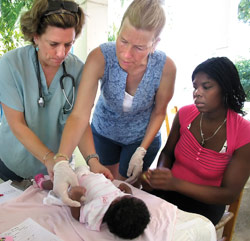During Haiti’s greatest challenge, Peoria continues its long-term involvement there via Friends of the Children of Haiti.
There, the Haitian people get medical care they otherwise couldn’t afford. Here, contributors help with gifts bearing a return rarely seen elsewhere. As always, Friends stands committed to bringing life and hope to the poorest country in the Western Hemisphere.
“We are in Haiti to stay,” says Eric Behrens, executive director of the not-for-profit. “To us, it’s pretty simple: We do our work, and people live. But without support, we can’t save lives.”
For a quarter-century, the Peoria-based Friends has brought medical care to Haiti, just a 90-minute plane ride from Miami. Conditions in the impoverished country have long been dire, with a life expectancy of just 50, unemployment often at 75 percent and an infant mortality rate of one in 10.
 Friends runs a permanent clinic in the seaside village of Cyvadier. With six two-week teams a year, Friends serves 15,000 patients who otherwise cannot afford medical care. Local residents refer to the clinic as “The House of Life.”
Friends runs a permanent clinic in the seaside village of Cyvadier. With six two-week teams a year, Friends serves 15,000 patients who otherwise cannot afford medical care. Local residents refer to the clinic as “The House of Life.”
“We’re proud to be such a vital part of life on the southern peninsula of Haiti,” says Behrens, 49, of East Peoria, who has been with the group nearly since its inception. “In our region in Haiti, we’re the only game in town. There are no other primary-care facilities like ours.
“Plus, we are a cornerstone of the community. The Haitian people know we’re striving to always be here. So we’ve been an anchor for residential and commercial development. That’s important for local residents, and we’re proud to be part of their lives in so many ways.”
Of course, January’s earthquake made Haiti more heartbreaking than ever before. For years, the country will face rebuilding; for years, many of its people will face unprecedented medical challenges.
Right after the quake, Friends arrived to help tend to quake-related injuries. Some patients had been buried for days, while others needed surgery for crush injuries. Over time, many of those patients will need ongoing care of those injuries.
 Meantime, Friends will do what it always does: provide primary medical care, much like a general practice in the States. A typical day might see pregnant mothers getting well-baby checks, youths getting checked for worms and scabies, and adults getting medicine for hypertension and diabetes. Whatever the myriad challenges, their treatment is monitored and adjusted over time, often years. That’s the core goal of the Friends: to give long-term care to people otherwise ignored by the rest of the world.
Meantime, Friends will do what it always does: provide primary medical care, much like a general practice in the States. A typical day might see pregnant mothers getting well-baby checks, youths getting checked for worms and scabies, and adults getting medicine for hypertension and diabetes. Whatever the myriad challenges, their treatment is monitored and adjusted over time, often years. That’s the core goal of the Friends: to give long-term care to people otherwise ignored by the rest of the world.
But the job can’t be done by volunteers alone. Support is crucial to provide the medicine needed for extensive, ongoing care.
“Medicine common in America is a luxury to many people in Haiti,” Behrens says. “It’s not unusual for Haitians to die of a common infection because they can’t afford a $2 prescription. Haitian people die because they don’t have two bucks.”
“You just don’t see that in America. Haiti isn’t so fortunate.”
But the country is fortunate to have the dedicated service of Friends of the Children of Haiti. And Friends of the Children of Haiti is fortunate that its supporters, even before the earthquake, have made a long-term commitment to helping the Caribbean nation. More than 90 cents of each dollar goes toward medical care in Haiti.
Never has the need been greater for Friends’ involvement. The work will be long and hard. Friends is ready to save lives. And you can make it happen in Haiti. Contributions can be made online at fotcoh.org or to FOTCOH, P.O. Box 789, Peoria, IL 61652. iBi


